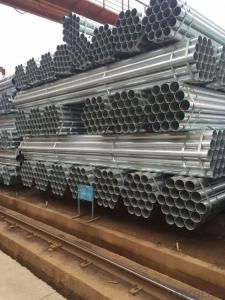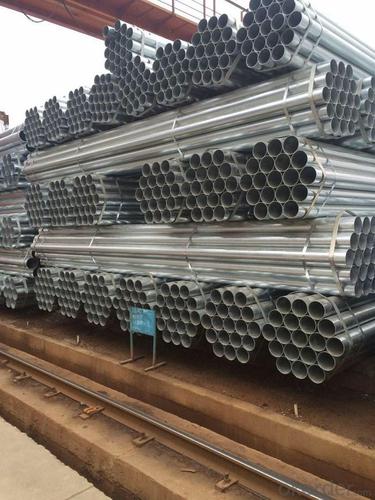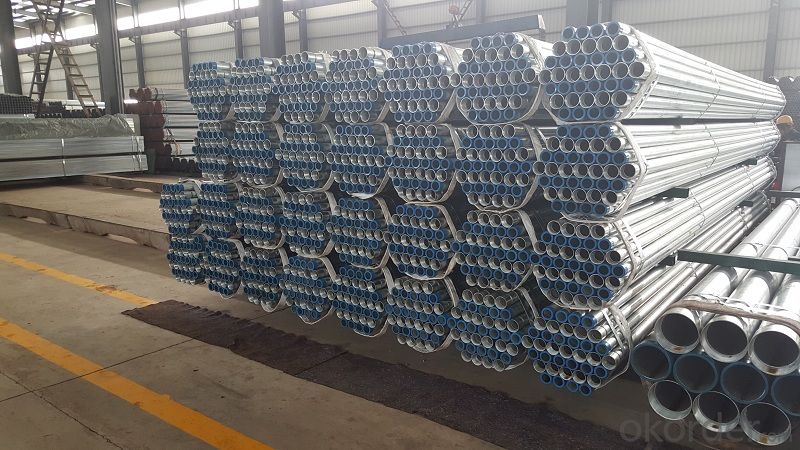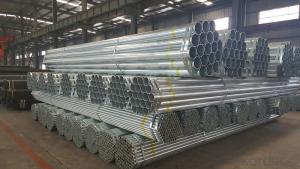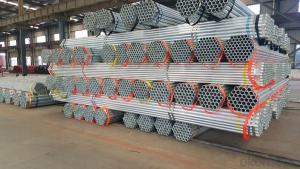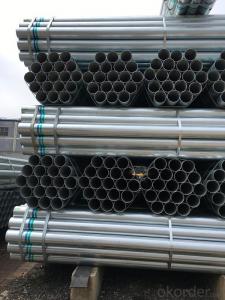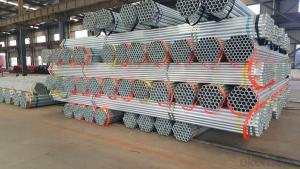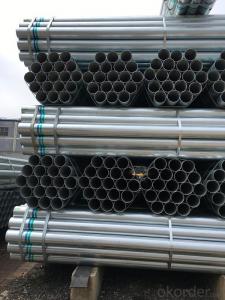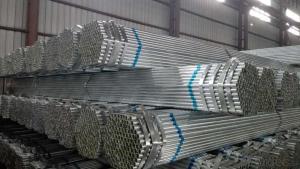Galvanized welded steel pipe for greenhouse
- Loading Port:
- Tianjin
- Payment Terms:
- TT OR LC
- Min Order Qty:
- 20 m.t.
- Supply Capability:
- 18000 m.t./month
OKorder Service Pledge
OKorder Financial Service
You Might Also Like
Specification
1、Structure of Galvanized welded steel pipe for greenhouse
The surface of galvanized steel pipe welded steel pipe of hot dip galvanized layer or. Galvanized can increase the corrosion resistance of the steel tube, prolong service life. Galvanized pipe is widely used, in addition to water, gas, oil and other general low pressure fluid pipelines. It is also used in the petroleum industry, especially for offshore oil field of oil well pipe and oil pipe, chemical, coking equipment of oil heater, condensation cooler, coal run oil exchanger tube, and trestle pile, the mine tunnel support frame tube.
2、Main Features of Galvanized welded steel pipe for greenhouse
• High manufacturing accuracy
• High strength
• Good visual effect
• Reasonable price
3、 Galvanized welded steel pipe for greenhouse Specification:
Standard | GB, DIN, ASTM ASTM A106-2006, ASTM A53-2007 |
Grade | 10#-45#, 16Mn 10#, 20#, 45#, 16Mn |
Thickness | 1 - 33 mm |
Section Shape | Round |
Outer Diameter | 21 - 610mm |
Place of Origin | Tianjin, China (Mainland) |
Secondary Or Not | Non-secondary |
Application | Hydraulic Pipe |
Technique | Cold Drawn |
Certification | API |
Surface Treatment | factory state or painted black |
Special Pipe | API Pipe |
Alloy Or Not | Non-alloy |
Length | 5-12M |
Outer Diameter | 21.3-610mm |
Grade | 20#, 45#, Q345, API J55, API K55, API L80, API N80, API P110, A53B |
Standard | ASME, ASTM |
1) Material:Q195 Q235 Q345 X42 X52
2) Specification range:OD:21.3-610mm,WT:6-70mm,length:6-12m or according to the requirement of clients.
3) Excutive standards:GB,ASME API5L.ASTM A 106/A53,Despite of the above standards,we can also supply seamless steel pipe with standard of DIN,JIS,and so on,and also develop new products according to the requirements of our clients!
4) Surface: galvanized.
5) Ends:Beveled or square cut,plastic capped,painted.
6) Packing:bundles wrapped with strong steel strip,seaworthy packing.
4、Packaging & Delivery
Packaging Details: | seaworthy package,bundles wrapped with strong steel strip |
Delivery Detail: | 15-30days after received 30%TT |
5、FAQ of Galvanized welded steel pipe for greenhouse :
①How is the quality of your products?
Our products are manufactured strictly according to national and internaional standard, and we take a test
on every pipe before delivered out. If you want see our quality certifications and all kinds of testing report, please just ask us for it.
Guaranteed: If products’ quality don’t accord to discription as we give or the promise before you place order, we promise 100% refund.
②How about price?
Yes, we are factory and be able to give you lowest price below market one, and we have a policy that “ for saving time and absolutely honest business attitude, we quote as lowest as possible for any customer, and discount can be given according to quantity”,if you like bargain and factory price is not low enough as you think, just don’t waste your time.Please trust the quotation we would give you, it is professional one.
③Why should you chose us?
Chose happens because of quality, then price, We can give you both.Additionally, we can also offer professional products inquiry, products knowledge train(for agents), smooth goods delivery, exellent customer solution proposals.Our service formula: good quality+good price+good service=customer’s trust
SGS test is available, customer inspection before shipping is welcome, third party inspection is no problem.
6、 Galvanized welded steel pipe for greenhouse Images:
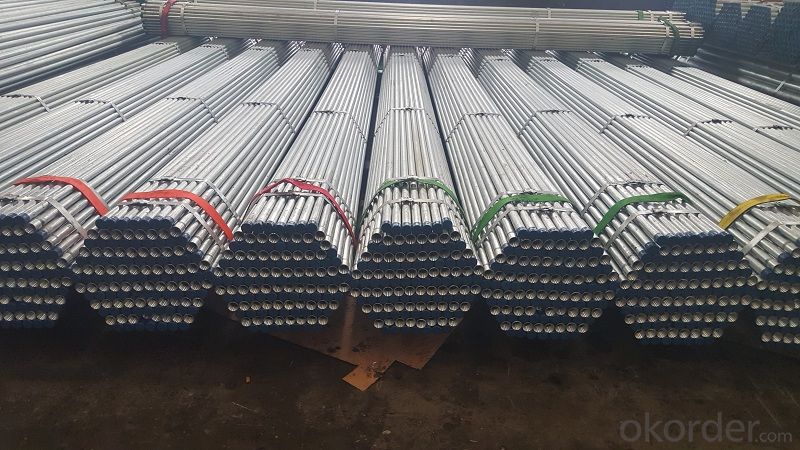
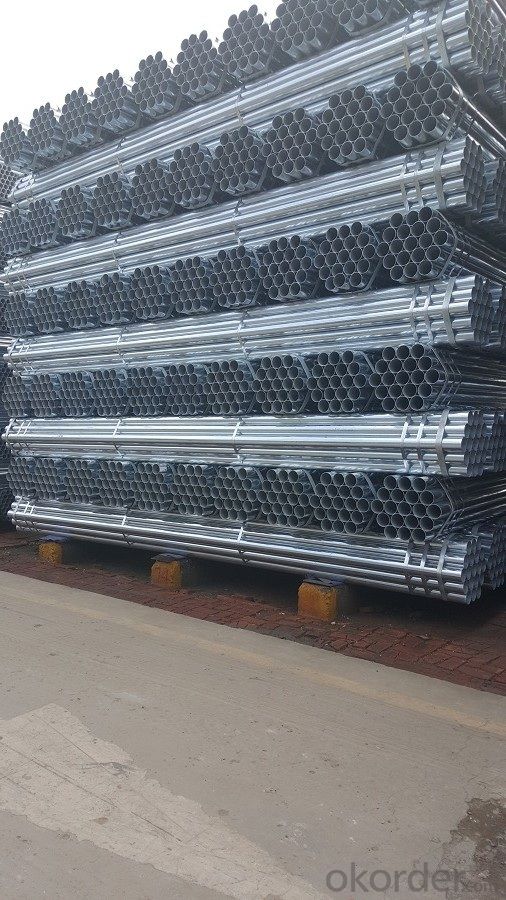
- Q: What are the environmental benefits of using steel pipes?
- Steel pipes have several environmental benefits. Firstly, steel is a highly durable material, which means that steel pipes have a longer lifespan compared to other types of pipes. This reduces the need for frequent replacements, ultimately reducing waste generation. Additionally, steel is 100% recyclable, making it a sustainable choice. Using steel pipes promotes a circular economy by reducing the demand for virgin materials and minimizing carbon emissions associated with extraction and manufacturing processes. Furthermore, steel pipes are resistant to corrosion, reducing the risk of leaks and minimizing environmental contamination. Overall, the environmental benefits of using steel pipes include reduced waste, lower carbon emissions, and improved resource efficiency.
- Q: How do steel pipes compare to other materials, such as PVC or copper?
- Steel pipes are generally more durable and have a higher resistance to heat, pressure, and corrosion compared to PVC or copper pipes. They are commonly used for applications that require strength and longevity, such as in industrial settings or for transporting high-pressure fluids. However, steel pipes can be more expensive and heavier than PVC or copper, making them less suitable for certain residential or lightweight applications. Ultimately, the choice of material depends on the specific requirements and budget of the project.
- Q: What is the minimum temperature that steel pipes can handle?
- The minimum temperature that steel pipes can handle depends on the specific grade and composition of the steel. Generally, steel pipes can handle extremely low temperatures without experiencing any significant issues. In fact, many types of steel are specifically designed to withstand extremely cold temperatures, making them suitable for various applications in industries such as oil and gas, construction, and cryogenics. However, it is important to note that at extremely low temperatures, steel may become more brittle, which can affect its mechanical properties. Therefore, it is essential to carefully select the appropriate grade of steel and consider any specific requirements or limitations for the intended application when determining the minimum temperature that steel pipes can handle.
- Q: How are steel pipes used in the pulp and paper industry?
- Steel pipes are commonly used in the pulp and paper industry for various applications including transporting water, steam, and chemicals throughout the manufacturing process. They are also used for conveying pulp and paper products, as well as for supporting structures such as boiler systems and storage tanks.
- Q: Can steel pipes be used for transporting gases?
- Yes, steel pipes can be used for transporting gases. Steel pipes are known for their strength, durability, and resistance to corrosion, making them an ideal choice for transporting various gases over long distances. Additionally, steel pipes can handle high pressure and extreme temperatures, ensuring the safe and efficient transportation of gases.
- Q: Can steel pipes be used for stormwater management systems?
- Yes, steel pipes can be used for stormwater management systems. Steel pipes are a commonly used material for stormwater management due to their durability, strength, and resistance to corrosion. They can effectively carry and transport stormwater, making them suitable for various applications in stormwater management systems.
- Q: Theoretical weight of 25*25*1.5 square steel tubes
- Square steel tube, referred to as square tube, also known as square tube, is a square pipe of a kind of name, that is, the length of the same steel pipe. The strip is rolled by process. Generally, the strip is disassembled, leveled, crimped and welded to form a round tube. The tube is then rolled into square tubes and cut to the required length, usually 50 pieces per package.
- Q: Can steel pipes be used for the construction of tunnels?
- Yes, steel pipes can be used for the construction of tunnels. Steel pipes are often used as support structures in tunnel construction due to their strength, durability, and ability to withstand high pressures. They can be used for various purposes such as drainage, ventilation, or as part of the tunnel structure itself. Additionally, steel pipes can be easily manufactured, transported, and installed, making them a popular choice in tunnel construction projects.
- Q: What are the environmental impacts of steel pipe production and disposal?
- Significant environmental impacts are associated with the production and disposal of steel pipes. First and foremost, the production of steel pipes necessitates the extraction of raw materials such as iron ore, coal, and limestone. This extraction process leads to the destruction of habitats, deforestation, and soil erosion. Furthermore, mining and processing these materials require a substantial amount of energy, often derived from fossil fuels, which contributes to the emission of greenhouse gases and air pollution. The manufacturing process itself encompasses various stages, such as melting, casting, rolling, and coating, all of which demand considerable energy inputs and emit substantial quantities of carbon dioxide and other greenhouse gases. Additionally, the production of steel pipes involves the utilization of chemicals and additives that can pose harm to the environment if not properly managed. Moreover, if steel pipes are not recycled or appropriately dealt with during disposal, they can end up in landfills, thus contributing to waste accumulation and occupying valuable space. Steel is typically non-biodegradable and can take hundreds of years to decompose. When steel pipes are dumped in landfills, they can release toxic substances and heavy metals, which can contaminate soil and groundwater. Nevertheless, it is important to acknowledge that steel pipes are highly recyclable, and recycling them significantly mitigates the environmental impact. Recycling steel pipes aids in the conservation of natural resources, reduces energy consumption, and lowers greenhouse gas emissions. Additionally, using recycled steel in the production of new pipes requires less energy and results in fewer emissions compared to using virgin materials. To minimize the environmental impacts of steel pipe production and disposal, it is crucial to advocate sustainable practices throughout the entire lifecycle of the product. This entails reducing energy consumption, utilizing renewable energy sources, implementing proper waste management strategies, and encouraging the recycling and reuse of steel pipes.
- Q: What is the difference between seamless steel pipes and seamless alloy steel pipes?
- The main difference between seamless steel pipes and seamless alloy steel pipes lies in their composition. Seamless steel pipes are made from carbon steel, which is primarily composed of iron and carbon. On the other hand, seamless alloy steel pipes are made from a combination of carbon steel and various alloying elements such as chromium, nickel, or molybdenum. These alloying elements enhance the properties of the steel, making it more resistant to corrosion, heat, and pressure. They also provide improved strength and durability, making alloy steel pipes suitable for applications that require high performance and reliability. In summary, while both seamless steel pipes and seamless alloy steel pipes are used for various industrial applications, alloy steel pipes offer superior performance due to their alloying elements, making them more suitable for demanding conditions.
Send your message to us
Galvanized welded steel pipe for greenhouse
- Loading Port:
- Tianjin
- Payment Terms:
- TT OR LC
- Min Order Qty:
- 20 m.t.
- Supply Capability:
- 18000 m.t./month
OKorder Service Pledge
OKorder Financial Service
Similar products
Hot products
Hot Searches
Related keywords
